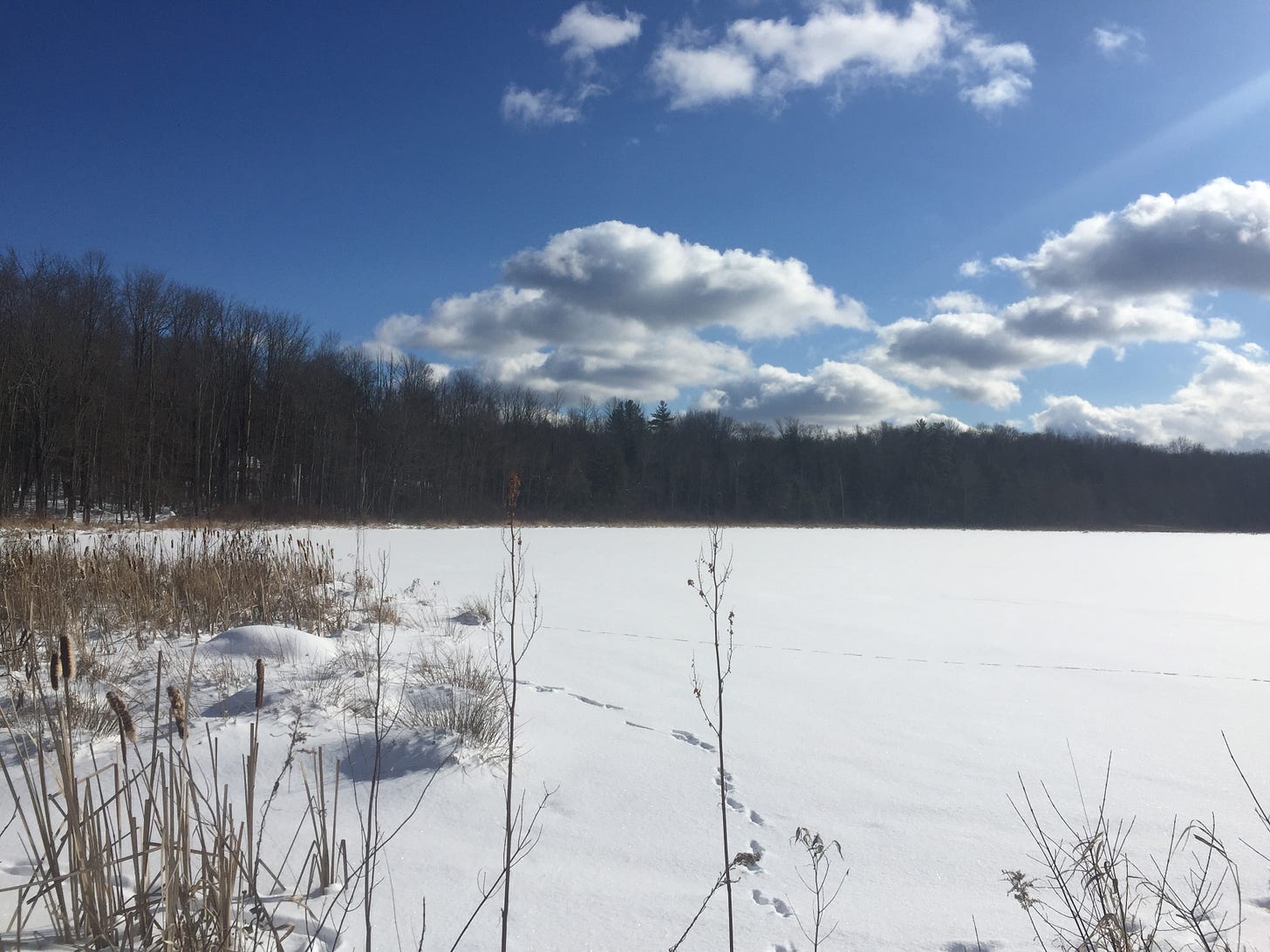Quoting The Rolling Stones was never part of my life plan, but here we are. This particular song endures, of course, not because of its fairly obvious assertion that we can’t always get what we want, but because of the resolution of that assertion— if you try sometimes, you just might find, you get what you need.
In the throws of either losing out on something you want or desperately striving for something that you don’t yet have, contemplating what you really need is a useful redirection. Reflective functioning, the ability to ascertain the differences between what is happening on the surface of interaction (what someone is saying they want) and what is happening underneath (what they actually need) is how we direct this contemplation outward, but we have to focus that attention inward as well.
I went for a slog around a loop trail at Jennings Pond the other day. My use of the word slog might not suggest what a delight it was, though it’s accurate. Stumble might also work, or trudge. The snow is about a foot deep in those woods, and though others had clearly trudged before me breaking something of a trail it was a slow, stumbling process. Still, the moment felt perfect— just cold enough to be brisk but not biting, the quiet nearly absolute. Sunlight shimmered on the untrammeled snow rolling off between the trees. Small animal tracks skimmed the surface, framed in relief against the sparkle.
As I tramped through the deep snow I found myself thinking about what I need, as opposed to what I want. The list of my wants is fairly extensive and not entirely reasonable. Some of them are material. Some of them are relational or experiential. I am a strongly desirous creature, honestly, so the list of things for which I thirst grows and morphs constantly.
What I really need, however, is a much shorter, simpler list. There are practical needs— a roof over my head, healthy food to eat— which are universal. Then there are needs that are particular to me. I need time and space to walk outside on a nearly daily basis all year round, for one.
I’ve always loved being in the woods, but it was really during this pandemic, when being outside was one of the only safe ways to get out of the house, that I was reminded how much I need to be out-of-doors regularly. Sure, it’s good for my physical health, but I’m not out there for exercise, per se. Whether or not I work up a proper sweat is not on my list of goals. The whole enterprise isn’t goal-oriented at all, actually. It’s about being, rather than doing. I move my body outside because I like myself and the world more when I do. I experience awe and delight and a level of calm that is otherwise unavailable to me, and I need those states of being quite desperately.
I also need to write. Writing is one of the ways in which I recognize myself. I only live comfortably inside my own skin when I write. When I commit myself to the page, my inner and outer lives become integrated. I feel whole.
But I also have to make a living in order to meet those universal needs, which has historically felt like a tension. I have walked away from writing almost entirely multiple times in the last decade because I couldn’t see a clear, unobstructed pathway to meeting my basic needs while also writing. Fear told me that it just wasn’t possible, writing and making a living were mutually exclusive.
When I look beyond that fear, though, approaching it as simply the foreground of a wider picture, I realize they aren’t mutually exclusive. They are paradoxical— two things that seem like they cannot exist at the same time in the same place, and yet they do. Or certainly, they can. The first trick of approaching them as a paradox is getting crystal clear on what I actually need materially, as opposed to all the things that I most definitely want.
The other, and perhaps harder trick, is unpacking the ways in which my understanding of my material needs and how best to meet them is intimately tied to my sense of self-worth. I’ve made more money before than I need to make right now in order to cover my basic bills, had access to funds from a spouse or partner, and I wasn’t any happier. In fact, I was decidedly less happy and more convinced that financial apocalypse was right around the corner.
The difference between then and now? Then, I had romantic partners who acted as if I wasn’t worth much. And I believed I needed those relationships— emotionally, financially— in order to be whole and experience abundance.
That belief was instilled in me via cultural osmosis and family patterning long before romantic partnership came into my life. Culturally, I (like all women and femmes) was taught from childhood that I was nothing without a partner. Wholeness and satisfaction could only be earned through being romantically chosen.
Concurrently and privately, members of my family were claiming to love me then behaving toward me in ways that were not loving— repeatedly, intentionally. The only way to make sense of that dissonance was to assume the fault lay with me. I wasn’t worthy of more or better, and an unloving love was the best I could expect. Life, as a result, rose to my expectations.
This is not some woo-woo, New Age-y, victim-blaming sort of assertion that I manifested my own trauma. Trauma happens because humans can be horrible. No one creates their own trauma. But they sure can stick around to be traumatized again and again because experience has trained them that’s what love is— abuse, betrayal, and a constant, gnawing feeling that you’re just not good enough to expect better.
There was no single, magic moment when I looked around myself and realized, “These people treat me like garbage because I think I’m garbage and I’m not! Enough of that!” Rather, it’s been a slow unraveling of deep-seated beliefs, expectations, and so much grief. Just when I think I’m on top of it all, that I’ve finished that bit of work, I realize I’m still working on it. All that old training has worn deep ruts in my psyche which have a natural tendency to pull me back down, but choosing a new path is essential to my integrity practice.
Integrating our consciously held beliefs into our daily lives and standing up for them as necessary is not the only work of integrity. Integrity is also digging up and out those noxious beliefs that we are living out unconsciously. Standing up to, and for, ourselves might, in fact, be some of the hardest and most radical work we ever do.
I am my own best asset— my skills, time, space, and heart. If I apply my assets with dedication on my own behalf instead of begging for the scraps that others are willing to pay for them, then my material and soul needs equalize. My material needs get right-sized and my soul needs get dignified.
Can I have a life where I walk and write and love my people who love me well that is materially abundant? You can’t always get what you want, as Jagger and Richards would say. But if I try, always, to embody an unwavering belief in my own inherent worth through my relationships and employment choices then I get what I need.
How do you embody your sense of self-worth?
A recommendation! If you enjoy Let Your Life Speak, you might also really enjoy Life Intelligence by Valentina Petrova. Another way of saying what I do above is that thinking critically about how my needs are met (or not) by the story I’m living allows me to revise that story. Valentina wrote this about the benefits of revising our stories:
The solution to old, outdated, and irrelevant stories is new, updated, and accurate ones. For that, we need to have new experiences. We must question our automatic responses, instantaneous judgments, and go-to narratives. We must be open to new information, fresh perspectives, other explanations, and uncomfortable experiences. We must hear feedback from others. We need new interpretations leading to new behavior and different choices. Or at least, we must revise and edit the old stories, as life presents us with such opportunities. This way, we have more than one tool in our toolbox. We become more versatile, resourceful, flexible, and comfortable in our own skin. We must remember that our old stories may not just hurt us. They hurt those around us, as we see them not for who they are but through the filters of our stories. They lead us to misunderstandings, misalignments, and mismatches.
Revising and editing may feel like a slow evolution, a gradual deviation from how things used to be. Or it could feel like writing a whole new chapter in life with new characters and a new plot. It could feel like an entire new Hero’s Journey to the abyss and back, emerging radically transformed. Rejecting the call to adventure is the first step on this journey. Don’t be too hard on yourself if you don’t feel like working hard to feel better. Just don’t get stuck there. If you chose to accept the challenge, despite the difficulty of undoing the familiar, you will emerge on the other side wiser and better with a new story. That’s a promise.
Check out more from Valentina at this link:








I embody my sense of self worth by putting my mind in its place when it tells me about how doing what I lights me up can't support me. I observe it, acknowledge it, and proceed to continue to physically make steps to affirm that I can indeed do what I love and it will support me. I do that through dance, sewing. writing, self-pleasure, creating boundaries around my time and energy, feeding myself well, and watching Dr Who when I don't have the energy for anything else. I also cultivate and nourish relationships with people who support me in my journey.
This post couldn't have come at a better time as I was just sharing some of my work around helping people with their relationship with money with a friend of mine so it was a delight to share.
Keep doing it lady. <3
The photo of you and your mom-----SOOOOOO beautiful, Asha!!